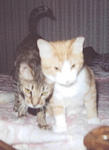Rescue Efforts
Looking for a Pet, or Just Want to Help Out....Read on!
Looking to Adopt a Dog or a Cat....Check out Katie's Kritter Corner
http://www.petfinder.com/shelters/PA521.html
Animal Rescue League of Berks County http://www.berksarl.org/index.htm
Cat Angel Network http://www.catangel.org/ ADOPTION CENTER LOCATED IN POTTSTOWN PETSMART
Chester County SPCA http://www.ccspca.org/
Dogue de bordeaux Rescue http://www.ddbsarescue.org/
One by One Cat Rescue http://www.1by1catrescue.org/ ADOPTION CENTER LOCATED IN WYOMISSING PETSMART
The Cat Shack http://members.petfinder.org/~PA138/adoption.html ADOPTION CENTER LOCATED IN WHITEHALL PETSMART
Montgomery County SPCA http://www.montgomerycountyspca.org/
![]()
![]()
![]()
![]()
What About the Feral Cats?
A feral cat is a cat which has been separated from domestication--by abandonment, loss, or running away--and becomes wild. The term also refers to descendants of such cats but not to wild cats whose ancestors were never domesticated. Adult feral cats that are born feral can rarely be socialized. Adult feral cats that were originally raised domestically can sometimes be resocialized, but not always. Feral kittens can sometimes be socialized to live with humans if they are taken from a feral colony before they are 6-8 weeks old.
What is Trap/Neuter/Return all about?
Trap/Neuter/Return, referred to as "TNR," is the only humanecmethod proven to be effective at controlling feral cat population growth. Using this technique, all the feral cats in a colony are trapped, neutered (also tested for Feline Leukemia, vaccinated, dewormed and ear tipped) and then returned to their territory where caretakers provide them with regular food and shelter. Young kittens who can still be socialized, as well as friendly adults, are placed in foster care and eventually adopted out to good homes.
TNR has many advantages. It immediately stabilizes the size of the colony by eliminating new litters. The nuisance behavior often associated with feral cats is dramatically reduced, including the yowling and fighting that come with mating activity and the odor of unneutered males spraying to mark their territory. The returned colony also guards its territory, preventing unneutered cats from moving in and beginning the cycle of overpopulation and problem behavior anew. Particularly in urban areas, the cats continue to provide natural rodent control.
Another significant advantage to TNR is that, when practiced on a large scale, it lessens the number of kittens and cats flowing into local shelters. This results in lower euthanasia rates and the increased adoption of cats already in the shelters.
TNR is not just the best alternative to controlling feral cat populations - it is the only one that works. Doing nothing has resulted in the current crisis in many cities across the country. Trying to "rescue" the cats and find homes for all of them is unrealistic given the tens of thousands of them out there. Trap and kill, the traditional technique exercised by animal control, is simply ineffective. If all the cats are not caught, then the ones left behind over breed until the former population level is reached. Even if all the cats are removed, new unneutered cats tend to move in to take advantage of whatever food source there was, and the cycle starts again. This explains why more and more animal control agencies are willing to try TNR.
Finally, TNR recognizes there is a new balance in our urban and rural landscape, one that includes feral cats. It seeks to manage this new population with enlightened techniques that allow the cats to live out their lives and fulfill their natures, while minimizing any possible negative impact. Remember the cats did not put themselves out there!! TNR is a movement that will continue to grow as more and more caring people see its potential and, in time, it will become the predominant method of feral cat population control.
For more information, please visit http://alleycat.org/ and www.neighborhoodcats.org
If you have a feral colony in the Berks County Pennsylvania area, please contact Fairchild Foundation at Fairchildfoundation@comcast.net or 610-763-8382 to speak to Diana Cutler, President and Founder. If you would like to make a tax-deductible donation to help the cats, please mail to PO Box 6431, Wyomissing, PA 19610.
